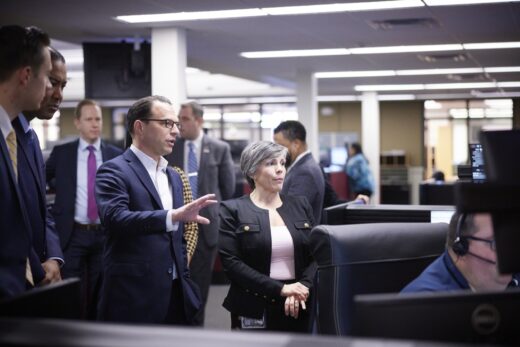By Marley Parish | Pennsylvania Capital-Star

Credit: PA Internet News Service
Kimberly Wilson never saw herself working in emergency services, but since becoming a 911 dispatcher in Montgomery County two years ago, she found her calling and never looked back.
She does the work, not for recognition, but to serve others, something she always knew she wanted in a career.
Venango County Commissioner Chip Abramovic, the president of the County Commissioners Association of Pennsylvania, considers Wilson one of the “angels” working in 911 emergency centers across Pennsylvania, ready to answer calls and provide people with needed resources.
But with a 23% increase in operational costs to run the 911 dispatch system across the commonwealth — and stagnant state funding allocations — since 2016, emergency responders need help themselves, Abramovic said Thursday during a stop in Montgomery County on Gov. Josh Shapiro’s statewide tour to promote his proposed 2023-24 budget plan.
The Democratic governor has called for investing $50 million in emergency dispatch systems and $36 million in new equipment and training for firefighters and EMS personnel.
“I know firsthand how our local municipal and county governments are on the frontlines of keeping their communities safe, and they need our support now more than ever,” Shapiro said. “My budget will ensure we do more to empower those on the frontlines overseeing our emergency response efforts.”
He also proposed creating the Public Safety and Protection Fund to fund four new State Police cadet classes and upgrade equipment while also reducing reliance on the Motor License Fund, which is a gas tax paid at the pump.
“The reason we need this funding is to give them the resources and the tools we need because everyone’s life is at stake,” Abramovic said, noting that 911 operators don’t care about someone’s political affiliation. “What we need is to have the funding to help give them the tools, the opportunities, and the responsibility so we can be better, and we can help individuals in a time of crisis.”
The Shapiro administration estimates that 20% of full-time 911 dispatch jobs remain unfilled in Pennsylvania, reporting 22,000 fewer volunteer firefighters in 2018 compared to the early 2000s and at least 6,000 fewer emergency medical technicians compared to 2012.

For years, counties and local governments have voiced concern about the growing strain on emergency services personnel, with volunteer-based fire departments and EMS providers considering shutting down due to financial stress and declining staff numbers.
Jennifer Cass, who serves as deputy director of emergency communications for Montgomery County, said the governor’s proposed investments in emergency services keep up with inflation and create an opportunity to enhance operations, such as enhancing location services and using multimedia technology to help walk callers through emergency procedures, such as CPR, and ensure they’re doing it correctly.
Though Shapiro said he’s “encouraged” by bipartisan support of some aspects of his proposed spending plan, negotiations are still ongoing, with lawmakers in the House and Senate conducting appropriations committee hearings through next month to hear from state agencies and department heads.
Earlier this month, state Rep. Seth Grove, R-York, raised questions about Shapiro’s proposal to eliminate the state cell phone tax for a $134 million savings for consumers. The 911 surcharge supports county emergency dispatch systems. And while it’s critical infrastructure, Grove thinks the funding source needs examination.
“We need to take a deep dive into the 911 fund to begin with,” Grove, the ranking Republican on the House Appropriations Committee, said. “How much are counties using it? How much are they really saving? Are they regionalizing? Are they doing cost-saving measures at the local level, and what can we do to incentivize those two?”
A final spending plan must be passed and signed by July 1.
Pennsylvania Capital-Star is part of States Newsroom, a network of news bureaus supported by grants and a coalition of donors as a 501c(3) public charity. Pennsylvania Capital-Star maintains editorial independence. Contact Editor John Micek for questions: info@penncapital-star.com. Follow Pennsylvania Capital-Star on Facebook and Twitter.








